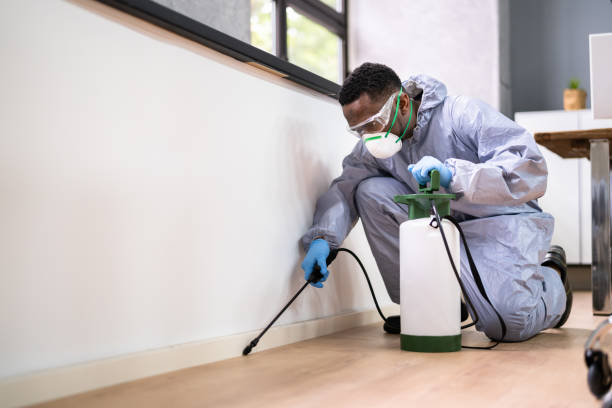Maintaining a clean and safe environment in our homes and places of work is impossible without effective pest management. It’s important to remember that bugs are more than just an irritation; they can be very dangerous to our health and wreak a lot of expensive damage to our belongings.
Neglected, pests of all kinds—from rodents and insects to termites and bed bugs—can cause significant disruption to your daily life. As luck would have it, we have access to excellent pest control methods that can help us maintain a pest-free environment in our homes and places of business.

In this article, we’ll talk about how controlling pests can enhance people’s lives in general.
How Is Pest Control Beneficial?
Keeping pests at bay is crucial to our health and happiness, and not only because it’s more comfortable and aesthetically pleasing. Taking preventative actions against pests is critical for maintaining a secure and healthy living space bugfree pest control can solve the most difficult pest problems in your home.
Because of the wide variety of bacteria, viruses, and other microbes that can be transmitted by pests, controlling them is an important step in preventing the spread of disease.
Cockroaches, for instance, can spread bacteria that cause food poisoning, while rodents like rats and mice can spread things like leptospirosis, hantavirus, and salmonellosis. The danger of developing such diseases can be lowered if these pests are kept under control.
Controlling pests has an additional benefit: avoiding costly repairs to private residences, public buildings, and business establishments. Pests like termites and carpenter ants can wreak havoc on a building’s structural integrity, necessitating costly repairs. Itchy bites from mosquitoes and other biting insects are a pain, and squirmy bedbugs can keep you up at night.
Pest control is beneficial in several ways. Here are some of the key advantages of implementing pest control measures:
Protects Your Health
Controlling pests is crucial for avoiding the spread of disease and decreasing your vulnerability to toxic substances. Disease-causing bacteria, viruses, and other pathogens can be carried and transmitted by pests including rodents, cockroaches, and mosquitoes.
Examples of diseases carried by rodents that can have devastating effects on people include the hantavirus, leptospirosis, and salmonellosis. On the other hand, cockroaches are known to spread diseases like E. coli and Salmonella as well as aggravate asthma and allergy symptoms. The West Nile virus, dengue fever, and malaria are just a few of the diseases that mosquitoes are known to spread.
Prevents Property Damage
Termites, carpenter ants, and rodents can do significant damage to your home, so it’s important to get them exterminated before it’s too late. Having to restore the damage caused by these pests or having their presence lower the value of your house or business is a costly and frustrating experience.
Termites are a pest that eats wood, which can weaken or even destroy a building’s support beams, joists, and joists, and eventually cause the structure’s collapse. In a similar vein, carpenter ants can compromise the integrity of a building’s construction by boring tunnels through its wooden support beams.
Large amounts of property damage can also be caused by rodents like rats and mice when they gnaw on wires, insulation, and other construction materials.
Promotes Hygiene
Hygiene, cleanliness, and a safe and healthy atmosphere are all aided by effective pest management. Cockroaches, rats, and flies are just a few of the pests that are known to spread disease and infection through their droppings and saliva, which contaminate food and other surfaces.
Cockroaches, for instance, can spread diseases like Salmonella and E. Coli, which can lead to food poisoning and other ailments in humans. Mice and rats carry infections including Hantavirus and Leptospirosis by their feces and urine, which contaminate food and other surfaces. By landing on and feeding on polluted food and surfaces, flies can potentially transfer hazardous bacteria and viruses.
Enhances Food Safety
Eliminating pests that could potentially contaminate food supplies and storage places is a crucial part of maintaining high standards of food safety. Rodents, cockroaches, and flies are just a few of the pests that can contaminate food with their waste products.
For example, rodents are notorious for wreaking havoc in warehouses and other storage facilities by destroying food packaging, urinating and defecating stored goods, and spreading disease.
Salmonella and E. coli can be spread by cockroaches because their excrement and body parts contaminate food and food storage places. Flies can spread disease-causing bacteria and viruses to humans when they land on and feed on food.
Provides Peace of Mind
Pest treatment can put your mind at ease by getting rid of the tension and anxiety that comes with dealing with a pest problem. Bed bugs, cockroaches, and other insects can make you feel uneasy in your own home and cause you a great deal of stress.
The longer an infestation lasts without being treated by a professional, the more irritating and frustrating it can become for the homeowner. Damage to property and personal possessions caused by pests can add to an already stressful and expensive situation.
Effective pest control procedures can get rid of existing pests and stop new ones from entering your home or place of business, making it a more pleasant place to be. Expert exterminators kill bugs without exposing their customers to unnecessary danger by employing tried-and-true techniques that are both effective and safe.
Bug Control: How Does It Work?
Insect management, commonly known as pest control, is the practice of reducing or removing pests from a certain area. Insects, rodents, and other animals are considered pests because they can harm property, carry illness, and give people discomfort and stress.
Methods that effectively combat insects work to not only get rid of existing pest populations but also to stop new ones from establishing themselves.
There are various methods for bug control, including:
Chemical Treatments
To exterminate unwanted pests, people often resort to the use of chemical pesticides, insecticides, and rodenticides. These pesticides are often placed in strategic locations, like crevices and other places pests like to hide. Although chemical treatments have their uses, they must be utilized carefully so as not to cause harm to humans, animals, or the environment.
Biological Controls
To exterminate unwanted pests, people often resort to the use of chemical pesticides, insecticides, and rodenticides. These pesticides are often placed in strategic locations, like crevices and other places pests like to hide. Although chemical treatments have their uses, they must be utilized carefully so as not to cause harm to humans, animals, or the environment.
Physical Barriers
The use of physical barriers can stop pests from entering a building or getting to a food supply. Mesh screens on doors and windows, caulking of gaps and crevices, door sweeps, and weather stripping are all examples of physical barriers.
Integrated Pest Management (IPM)
Integrative Pest Management (IPM) is an all-encompassing strategy that utilizes a wide variety of pest control techniques to successfully manage and get rid of unwanted pests. Pest species are identified, infestation levels are determined, and a tailored plan employing different control strategies is then implemented.
Conclusion
Controlling pests is important for many reasons, including securing the well-being of you and your family, safeguarding your home and belongings, and ensuring the cleanliness and safety of your food.
You can get rid of pests and stop them from returning by working with an extermination service to create a unique strategy that fits your needs. Maintaining a pest-free, secure, and healthy home or workplace is possible with a thorough and continuing bug management plan.

Leave a Reply